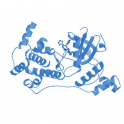
- Remove this product from my favorite's list.
- Add this product to my list of favorites.
Products
Newsletter
 |  |  |  |  |  |

Background: Maternal embryonic leucine zipper kinase (MELK) was originally identified as a signal transduction factor is also a cell cycle-dependent protein kinase that belongs to the KIN1/PAR-1/MARK family. MELK2 is the only member of the subfamily of AMP-activated Ser/Thr protein kinases that is not activated through T-loop phosphorylation but by autophosphorylation. In addition, MELK is regulated through phosphorylation by cyclin-dependent kinases (Cdks) and MAP kinases. Several studies have implicated MELK in various cellular processes, including (a)symmetric cell division, transcription, pre-mRNA splicing, DNA repair and apoptosis.
Human MELK (maternal embryonic leucine zipper kinase), amino acids M1-A342, protein kinase domain, untagged, recombinant and active enzyme, untagged,expressed in Sf9 insect cells
Theoretical MW : 39.852 kDa (fusion proteins)
Expression system: Baculovirus infected Sf9 cells
Purification: GST-Affinity Chromatography followed by 3C mediated removal of GST-tag
Storage buffer: 50 mM HEPES pH 7.5, 100 mM NaCl, 5 mM DTT, 20% glycerol
Protein concentration: 0.191 mg/ml (Bradford method using BSA as standard protein)
Method for determination of Km value & specific activity: Filter binding assay MSFC membrane
Specific activity : 6,000 pmol/mg min
Entrez Gene ID: 9833
UniProtKB: Q14680
Ordering information: shipped on dry ice
Jiang P1, Zhang D. (2013) Maternal embryonic leucine zipper kinase (MELK): a novel regulator in cell cycle control, embryonic development, and cancer.Int J Mol Sci. 2013 Oct 31;14(11):21551-60.
Kig C1, Beullens M, Beke L, Van Eynde A, Linders JT, Brehmer D, Bollen M. (2013) Maternal embryonic leucine zipper kinase (MELK) reduces replication stress in glioblastoma cells.J Biol Chem. 2013 Aug 16;288(33):24200-12.
Welcome Login
Contact us
Follow us